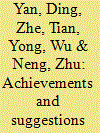| Srl | Item |
| 1 |
ID:
109311


|
|
|
|
|
| Publication |
2011.
|
| Summary/Abstract |
In order to promote energy efficiency and emission reduction, the importance of improving building energy efficiency received sufficient attention from Chinese Government. The heat metering and energy efficiency retrofit for existing residential buildings of 0.15 billion m2 in northern heating regions of China was initiated in 2007 and completed successfully at the end of 2010. This article introduced the background and outline of the retrofit project during the period of 11th five-year plan. Numerous achievements that received by retrofit such as environmental protection effect, improvement of indoor environment, improvement of heating system, investment guidance effect, promotion of relevant industries and increasing chances of employment were concluded. Valuable experience that acquired from the retrofit project during the period of 11th five-year plan was also summarized in this article. By analyzing the main problems emerged in the past, pertinent suggestions were put forward to promote a larger scale and more efficient retrofit project in the period of 12th five-year plan.
|
|
|
|
|
|
|
|
|
|
|
|
|
|
|
|
| 2 |
ID:
125589


|
|
|
|
|
| Publication |
2013.
|
| Summary/Abstract |
On 14 November 2012 the new EU-directive 2012/27/EU was published in the Official Journal of the European Union. In the directive there is a requirement, among others, for individual consumption meters for heat and hot water to be installed by 31 December 2016 in multi-apartment buildings. Individual consumption meters had earlier been found to create a saving behavior due to the tenants being charged for their own use of heat and hot water. The purpose of this study is to investigate how widespread is the use of individual metering and charging (IMC) of heat and hot water among cooperatively owned multi-apartment buildings in Sweden. An additional purpose is to investigate the level of knowledge of and the attitude to IMC. This has been done through data collection and interviews of board members in randomly selected housing cooperatives, divided into different categories. The result indicates a very low spread and a strong resistance against IMC for heat and hot water. The perception of a low cost-efficiency is probably the most important reason, but also a low level of knowledge about IMC could contribute. The result can give some indication of the work needed to carry out the new EU-directive.
|
|
|
|
|
|
|
|
|
|
|
|
|
|
|
|
| 3 |
ID:
150357


|
|
|
|
|
| Summary/Abstract |
In spite of over 10 years of heat metering promotion in China, there still lays a certain gap between actual application and expectation. In this paper, the author conducts a comprehensive carding of China's current situation of heat metering in the aspects of policy, price, application area, technical roadmap, product quality and so on. An application effect evaluation model is established based on the geometric mean weights method. Assignments and weighs of factors in the model are achieved via multi-agent wide range of questionnaires. Comparisons are made among model results, results published by Liu Xin and the results released from the Ministry of Housing and Urban–Rural Development of the People's Republic of China (MOHURD), which proves rationality and high accuracy of the model established in this paper. Evaluation results show that application of heat metering in 2012 requires improvement with the score pegged at 60.7. It is suggested that policy support from national government should be strengthened, the impact of policies released by provincial government be curbed and heat metering pricing be increasingly reasonable. Application conditions of different metering techniques routes need to be clarified and relevant standards need to be revised to improve the operation.
|
|
|
|
|
|
|
|
|
|
|
|
|
|
|
|